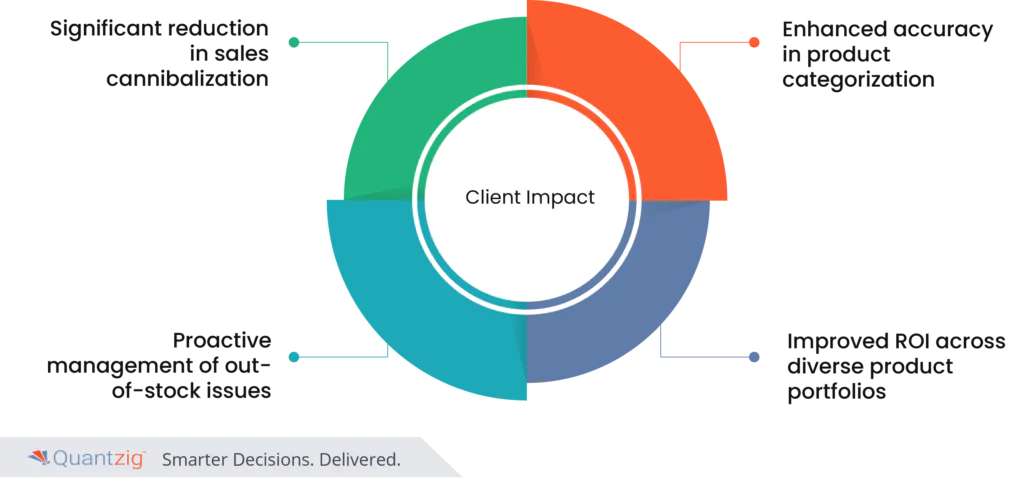In the fast-paced world of business, understanding the dynamics of product cannibalization is imperative for sustained success. With consumer preferences constantly shifting and product portfolios expanding, businesses face the challenge of optimizing their offerings without inadvertently cannibalizing sales of existing products. This is where product cannibalization analysis becomes crucial in maintaining a balanced portfolio and safeguarding revenue streams.
In response to this challenge, Quantzig, a pioneering analytics firm, presents a groundbreaking approach to detecting and analyzing factors impacting product cannibalization through its Time Series Cannibalization Modeling methodology. By illuminating the intricacies of product cannibalization analysis and providing actionable insights, our analytics experts equip B2B clients with the tools necessary to navigate this complex landscape, make informed decisions, and sustain market competitiveness. Through this case study, we aim to showcase Quantzig’s unparalleled expertise in addressing this critical aspect of modern business strategy.
We offer Product Cannibalization Analytics Dashboard Solutions, an advanced and comprehensive platform for businesses seeking to understand and manage sales cannibalization within their portfolio. Leveraging cutting-edge analytical techniques and robust data management frameworks, our solutions deliver insights that reveal internal competition and help businesses strategize effectively.
Book a demo to experience the meaningful insights we derive from data through our product cannibalization analytical tools and platform capabilities. Schedule a demo today!
Request Free DemoTable of Contents
What is Product Cannibalization Analysis and How Can Businesses Leverage It?
Product cannibalization analysis involves evaluating the impact of new product introductions on the performance of existing offerings. It is especially valuable for companies launching similar products or expanding locations. The objective is to assess whether the new addition will draw customers away from existing products, potentially resulting in a revenue drop.
This analysis is vital in multi-location or multi-brand strategies and enables informed decisions regarding expansion, closure, or repositioning. By using insights from product cannibalization analysis, businesses can allocate resources efficiently and maintain a competitive edge. Incorporating factors like overstocks, markdowns, product mix, and sales strategy enhances the effectiveness of this analysis. Additionally, the use of predictive analytics, AI-powered tools, and advanced analytics solutions allows for optimization in pricing, assortment, and inventory. Establishing a Cannibalization Data function and Cannibalization Overlap function also streamlines the data collection and evaluation processes. Integrating market share analysis and a robust omnichannel strategy ensures a complete understanding of competitive dynamics.
1. Spatial Dynamics and New Locations:
The advent of 5G technology has revolutionized spatial dynamics, allowing businesses to explore new locations seamlessly. When considering expansion, businesses must analyze geographic footprints, catchment areas, and competitor landscapes. Using advanced spatial analysis tools, companies can strategically position themselves to maximize market potential and mitigate sales cannibalization risks.
2. Retail Module and Data Function:
Implementing a retail module integrated with a Cannibalization Data function ensures smarter decision-making. Datasets such as market share analysis and shopping trends should be centralized within the system. The Cannibalization Overlap function enables businesses to identify internal conflicts, which are visually represented using analytical dashboards. This information supports the design of an effective omnichannel strategy to minimize cannibalization and optimize sales.
3. Market Research and Customer Base Analysis:
Comprehensive market research is crucial in refining a cannibalization strategy. Businesses should examine customer base trends, chain store performance, and competitor impacts to calculate how to calculate cannibalization rate accurately. This data-driven approach allows companies to craft tailored marketing efforts that drive engagement while minimizing revenue loss.
Strategic Approach for Product Cannibalization Success
In today’s competitive environment, mastering a robust cannibalization strategy is vital for balancing innovation with profitability. Here are some core tactics:
- Omnichannel Strategy: Integrating online and offline channels delivers seamless shopping experiences and reduces risks of sales cannibalization by distributing customer attention effectively.
- Corporate Cannibalism Awareness: Identify and address competition between internal products. Strategic product positioning mitigates revenue dilution.
- Investor Communication: Transparent updates on product cannibalization analysis, profitability efforts, and short-term strategic shifts build investor confidence.
Incorporating terms such as overstocks, markdowns, product mix, and sales strategy into product cannibalization analysis can enhance its effectiveness. Moreover, leveraging predictive analytics, AI-powered analytics solutions, and advanced analytics solutions can provide deeper insights into market dynamics and assist in optimizing pricing strategy, assortment strategy, and inventory management.
Establishing functions like Cannibalization Data function and Cannibalization Overlap function can streamline data collection and analysis processes, aiding decision-making. Additionally, integrating market share analysis and omnichannel strategy into product cannibalization analysis ensures a comprehensive understanding of the competitive landscape and customer behavior across various channels.
Quantzig Case Study
Working with a major FMCG retailer based out of the United States, Quantzig was able to rapidly deliver a measurement framework for analyzing the promotions and discounting strategies that impact the sales of existing products.
This retail product cannibalization analysis framework empowered them to evaluate promotions and the ROI generated across product categories. It also offered a unified view of impact, enabling deeper insights into customer buying patterns and sales cannibalization. The new framework improved data capture, preprocessing, geographic footprint mapping, and significantly benefited sales performance and product launch benchmarking
The FMCG industry is highly competitive, and in today’s retail environment, effectively leveraging data is essential for successful product launches. Although many FMCG retailers pioneered data analytics, significant information from key industry areas remains underutilized due to limitations in control and capability. One critical aspect of navigating this complexity involves developing a solid cannibalization strategy, particularly when analyzing the impact of promotions and discounts. As consumer behavior evolves through social media and digital platforms, retailers are adopting advanced statistical techniques to optimize outcomes.
Despite existing efforts, many FMCG retailers fall short in identifying data sources that could drive impactful decisions. The next generation of industry leaders will be those who utilize FMCG analytics to reshape their operational strategies and market performance.
Experience the advantages firsthand by testing a customized complimentary pilot designed to address your specific requirements. Pilot studies are non-committal in nature.
Request a Free PilotThe Business Challenge
In the fiercely competitive landscape of Fast-Moving Consumer Goods (FMCG), our client, a prominent retailer in the United States, grappled with a daunting sales decline attributed to cannibalization. The intricacies of their challenges became apparent through a meticulous analysis, exposing inaccuracies in categorization and the absence of a robust retail cannibalization analysis framework. Recognizing the urgency to mitigate these issues, the client turned to Quantzig, inspired by insights gained from our experts’ illuminating webinar.
Key Challenges:
- Sharp decline in sales linked to cannibalization: The client encountered a significant decrease in sales, directly attributed to product cannibalization within their portfolio. This phenomenon occurs when the introduction of a new product negatively impacts the sales of an existing one within the same category.
- Inaccurate categorization contributing to sales challenges: The client faced difficulties stemming from inaccurate categorization of products, which exacerbated sales challenges. Incorrect classification hindered effective analysis and decision-making, leading to suboptimal outcomes.
- Lack of a robust analysis framework: The absence of a robust analysis framework hampered the client’s ability to discern the underlying factors driving sales declines and to formulate targeted strategies to address them.
Quantzig’s Approach:
In today’s fast-paced consumer goods industry, staying ahead of the curve is paramount. With ever-evolving consumer behaviors and market dynamics, businesses must leverage advanced analytics to gain precise insights and drive informed decisions. This is where Quantzig, a leading analytics firm, shines with its innovative approach to Fast-Moving Consumer Goods (FMCG) analytics.
- Leveraging FMCG Analytics for Precise Demand Insights: Our innovative approach begins with harnessing the power of FMCG analytics to gain in-depth insights into demand transference dynamics. By thoroughly analyzing consumer behaviors and preferences, Quantzig’s team uncovers patterns of product substitution and cannibalization. Armed with these insights, clients can make informed decisions, ensuring their offerings align seamlessly with market demand.
- Developing a Comprehensive Analysis Framework: At the heart of our success lies its ability to develop tailored analysis frameworks. These frameworks are not one-size-fits-all but are instead crafted to meet each client’s specific needs. By integrating advanced statistical methodologies and cutting-edge data visualization and data preprocessing techniques, our experts facilitate in-depth exploration of sales trends, product relationships, and market dynamics, empowering clients with actionable intelligence.
- Mitigating Challenges and Optimizing ROI: One of the key challenges faced by FMCG businesses is managing out-of-stock issues while maximizing return on investment across product portfolios. We address this challenge head-on by implementing strategies derived from insightful analysis. By aligning inventory levels with demand patterns and refining product positioning strategies, Quantzig helps clients enhance sales performance and gain a competitive edge in the market.
Client Impact:

The partnership with Quantzig led to a transformative impact for the client. They experienced a significant reduction in sales cannibalization, which helped stabilize and grow their revenue streams. Additionally, improvements in product categorization accuracy enhanced the precision of their analytics and decision-making. Through proactive inventory management, the client was able to better align stock levels with actual demand, minimizing out-of-stock situations and excess inventory. These strategic improvements collectively contributed to an enhanced ROI across multiple product lines. By collaborating with Quantzig, the client not only resolved their immediate challenges but also secured a long-term competitive advantage in FMCG analytics.
Get started with your complimentary trial today and delve into our platform without any obligations. Explore our wide range of customized, consumption-driven analytical solutions services built across the analytical maturity levels.
Start a Free TrialSolution Offered by Quantzig:
Challenges Breakdown:
Quantzig’s FMCG analytics experts employ a systematic approach to address complex challenges, breaking them down into three distinct components and interconnecting them through a streamlined yet robust coordination layer. This breakdown enables the development of a comprehensive framework tailored to the client’s needs, empowering them to effectively assess demand transference and their direct implications on overall ROI. By dissecting challenges and establishing connections between them, we ensure that clients gain actionable insights and make informed decisions to drive sustainable growth and success in the dynamic FMCG market.
Enhancing Sales Execution Levers:
Enhancing sales execution levers is crucial for maximizing profitability and staying ahead in the competitive FMCG landscape. Quantzig’s approach begins with pricing optimization, where in-depth analysis is conducted to fine-tune pricing strategies, ensuring maximum return on investment. Through strategic adjustments to promotional activities, our team enables clients to target the right audience at the right time, driving sales and brand visibility. Furthermore, distribution optimization plays a pivotal role, as we help enhance distribution strategies to optimize portfolio ROI, ensuring products reach customers efficiently and effectively.
Time Series Cannibalization Modeling:
Time Series Cannibalization Modeling is a cornerstone of Quantzig’s analytics strategy, enabling businesses to navigate complex market dynamics with precision. Through an exhaustive Historical Data Dive, our analytics experts conduct in-depth analysis of historic sales data sets, uncovering invaluable insights into market trends and consumer preferences. Leveraging advanced Pattern Recognition techniques, we identify recurring sales patterns, allowing businesses to anticipate market fluctuations and adapt strategies accordingly. Moreover, through rigorous Customer Behavior Analysis, we provide deeper insights into customer buying behavior across categories, facilitating targeted marketing efforts and product positioning. Finally, our accurate Bounce-Back Rate Assessment enables businesses to gauge the implications of product launches on marketing efforts, empowering informed decision-making and ensuring sustained growth in the competitive FMCG sector.
Quantzig’s Proprietary Solutions:
Our proprietary solutions offer unparalleled depth and precision in addressing key challenges faced by FMCG businesses. Through Advanced Time-Series Models, our team leverages proprietary techniques to provide comprehensive analysis of product cannibalization dynamics, enabling clients to make data-driven decisions with confidence. Historical Pattern Identification uncovers recurring trends and behaviors within historic sales data, offering valuable insights for strategic planning and forecasting. Moreover, our expertise in Customer Behavior Insights allows for a nuanced understanding of consumer preferences and purchasing patterns, informing targeted marketing strategies and product development initiatives. Additionally, with Bounce-Back Precision, our experts accurately assess the impact of product launches on marketing efforts, facilitating agile adjustments and maximizing ROI. Together, these proprietary solutions empower clients to navigate the complexities of the FMCG landscape and achieve sustainable growth and success.
Strategic Tweaks for Maximized ROI:
Our strategic tweaks for maximizing ROI encompass a holistic approach to optimizing various facets of FMCG operations. Through optimized pricing strategies, we fine-tune pricing mechanisms to align with market demand, driving enhanced portfolio ROI. Strategic promotional adjustments ensure promotional activities are finely tuned to resonate with target audiences, amplifying their impact and bolstering ROI. Furthermore, distribution optimization involves refining distribution strategies to ensure products reach consumers efficiently, thereby maximizing overall ROI. By implementing these strategic tweaks, we empower businesses to navigate the complexities of the FMCG landscape with precision, driving sustainable growth and profitability.
Quantzig’s holistic approach empowered the client to not only comprehend the complexities of market cannibalization but also strategically tweak sales execution levers for maximum ROI and POS (points of sale). By leveraging advanced time-series modeling, recurring patterns were identified, providing deeper insights into customer behavior and bounce-back rates post-product launches. This comprehensive omnichannel strategy enabled the FMCG retailer to make informed, data-driven decisions, maximize the impact of their marketing efforts, and stand out from their competitors.
Value Delivered
The devised cannibalization framework empowered the FMCG retailer to:
- Devise a roadmap to gauge demand transference within product portfolios
- Estimate sales impact results with bounce-back rates
- Design data-driven pricing and promotional strategies to drive sales
- Leverage time-series cannibalization modeling to gauge the real dollar impact of new product launches on the existing products
- Accurately model the short- and long-term implications of new launches on the generated ROI
Conclusion
In conclusion, tackling product cannibalization analysis requires mastery of retail behavior, spatial dynamics, and competitive factors. Quantzig’s advanced analytics framework offers B2B clients the tools to navigate these complexities and stay ahead. With specialized modeling and customer insights, businesses can identify and manage risks, sharpen their cannibalization strategy, and ensure long-term success.



